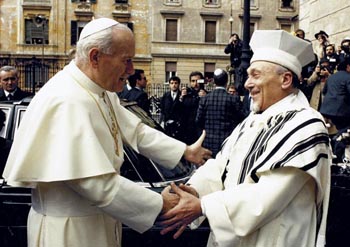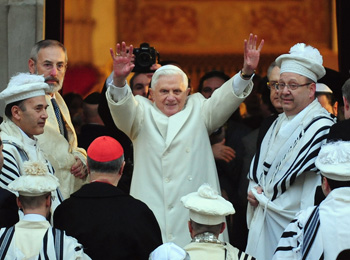Scriptures Don’t Teach Us this Medicine
In his opening speech to Vatican Council II, Pope John
XXIII urged the Council members when considering the topic of error and
sin, to use the medicine of mercy rather than “the arms of severity.”
The Pope's desire to “soften” the Church's teaching concerning error derived from his belief that the sophistication and intelligence of modem man was such that the use of severity in dealing with error was repellant to him. Consequently, according to the Pope, the Church should be more “merciful” in its teachings regarding error by only showing the validity of her teaching. (1)
The Pope's desire to “soften” the Church's teaching concerning error derived from his belief that the sophistication and intelligence of modem man was such that the use of severity in dealing with error was repellant to him. Consequently, according to the Pope, the Church should be more “merciful” in its teachings regarding error by only showing the validity of her teaching. (1)
John XXIII held to this belief, despite it being obviously
contradicted by facts. For example, during the decades just preceding
his papacy, the world suffered through two world wars between countries
governed by so-called intelligent and sophisticated men, yet millions of
people, including military and innocent civilians, were killed. (2)
In his work Iota Unum, Romano Amerio points out that the Pope, by restricting the discussion of error to the medicine of mercy, “reduces by half the amount of help that can be offered since he restricts the whole duty of the Church regarding the person in error to the mere presentation of the truth: This is supposedly enough in itself to undo the error, without opposing it. The logical work of confutation is to be omitted to make way for a mere 'didascalia' on the truth, trusting that it will be sufficient to destroy error and procure assent. " (3)
It is the purpose of this series to show that the drastic change in dealing with error has led to the conciliar Church's “slippery slope” slide to a near total abandonment of Christ's purpose for establishing His Church, which is to give honor and glory to God and the salvation of souls. (4)
Biblical citations regarding correction of error are characterized by clarity, severity and mercy, and these served as models for correcting error by the Church prior to Council.
For example, concerning those who commit sins of the flesh, St. Paul states such individuals become “filled with all iniquity, malice, fornication, avarice, wickedness: full of envy, murder, contention, deceit, malignity; whisperers, detractors, hateful to God, contemptuous, proud, haughty, inventors of evil things, disobedient to parents, foolish, dissolute; without affection, without fidelity, without mercy. Who, having known the justice of God, did not understand that they who do such things are worthy of death; and not only them, but they also that consent to them that do them.” (Rom 1:29-32)
 The angels will go out and separate the wicked from the just, & shall cast them into the furnace of fire
With regard to the sin of adultery, St. James says: “Adulterers, know
you not that the friendship of this world is the enemy of God? Whosoever
therefore will be a friend of this world, becomes an enemy of God.”
(James 4:5)
The angels will go out and separate the wicked from the just, & shall cast them into the furnace of fire
With regard to the sin of adultery, St. James says: “Adulterers, know
you not that the friendship of this world is the enemy of God? Whosoever
therefore will be a friend of this world, becomes an enemy of God.”
(James 4:5)
On the sin of hypocrisy Jesus himself says: “Hypocrites, well hast Isaias prophesized of you saying: This people honor me with their lips; but their heart is far from me. And in vain do they worship me, teaching doctrines and commandments of men. And having called together the multitudes unto Him, He said to them: Hear ye and understand, Not that which goes into the mouth defiles a man: but what cometh out of the mouth, this defiles a man.” (Mt: 15:7-11)
Jesus condemns the sin of slander with these strong words: “But the things which proceed out of the mouth come forth from the heart; and these things defile a man. For from the heart come forth evil thoughts, murders, adulteries, fornications, false testimonies, blasphemies. These are the things that defile a man. But to eat with unwashed hands does not defile a man.” (Mt 15:18-20)
Concerning sinners in general, Jesus says: “So shall it be at the end of the world. The angels go out and shall separate the wicked from among the just and shall cast them into the furnace of fire. There, shall be weeping and gnashing of teeth” (Mt 13:49-50).
To those who scandalize “the little ones,” Jesus warns: “Whosoever shall scandalize even one of these little ones that believe in Me, it would be better for him that a millstone were hanged around his neck and he were cast into the sea” (Mk 9:41).
The phrase “scandalize the little ones” refers not only to children, but also to the faithful, for the latter have the right to receive teaching that does not contradict the Magisterium of the Church.
An unheeded warning
This right was confirmed by then Cardinal Joseph Ratzinger in his address to the community of St. Michael's College in Toronto, Canada, in April 1986. Ratzinger said: “The hierarchy and the Church must not scandalize the ‘little ones,’ the primary duty of the Church is protecting the Faith of ordinary people” and “those in charge cannot abuse the faithful 's readiness to listen.” (5)
 Three conciliar Popes give false teaching on ecumenism: Above,
JPII's historic embrace in 1986 with the chief rabbi on Rome Synagogue visit
Three conciliar Popes give false teaching on ecumenism: Above,
JPII's historic embrace in 1986 with the chief rabbi on Rome Synagogue visit
 Benedict grins & waves before entering the Rome Synagogue in 2010
Benedict grins & waves before entering the Rome Synagogue in 2010
 Francis bows submissively before the chief rabbi in the Rome Synagogue, January 2016
Francis bows submissively before the chief rabbi in the Rome Synagogue, January 2016
In his address the Cardinal also commented on the failure of the Vatican
to confront progressivist deviations. He said: “The myth of Vatican
harshness in the face of progressivist deviations has been shown to be
an empty speculation. Basically, as of today, only admonitions have been
issued [which are] in no case fully canonical in the proper sense.”
Ratzinger's words were a clear acknowledgment that the Vatican had yet to take any truly effective action to protect the souls of the 'little ones' from the many soul endangering doctrinal deviations so prevalent in the conciliar Church. To drive home the point, he added:
“The same Bishop, who, before the [Second Vatican] Council used to have an irreproachable professor expelled for somewhat uncouth speech, is in no position to remove, after the Council, a teacher who is denying openly some fundamental truth of the Faith.”
This statement, made by the then-Cardinal in charge of preserving the integrity of the Faith, was a forthright admission of the complete breakdown within the conciliar Church of the integrity of the teaching of the faith.
This blunt admission of failure to enforce the integrity of the teaching of the Faith also shows that in the conciliar Church, the desires of theologians and modernists to promote false teachings among the “little ones” far outweighs any consideration for the effect of such false teachings on the souls of the “little ones.”
Ratzinger's words carried a sense of irony considering that he himself, as head of Congregation for the Doctrine of the Faith and later as Pope Benedict XVI, showed the same disregard for preserving the integrity of the Faith that he complacently noted in his speech (see examples here, here and here). He relentlessly followed the progressivist line of thought by continuously promoting the new theology, encouraging ecumenism and upholding religious liberty.
In other words, the conciliar Church – which counts in its numbers Pope Ratzinger – is more concerned with protecting poisonous progressivist teaching than with preventing it! Put it in another way, to the conciliar Church, protecting the promoters of doctrinal deviation is paramount, while protecting the souls of the “little ones” is, at best, very secondary!
To be continued...
In his work Iota Unum, Romano Amerio points out that the Pope, by restricting the discussion of error to the medicine of mercy, “reduces by half the amount of help that can be offered since he restricts the whole duty of the Church regarding the person in error to the mere presentation of the truth: This is supposedly enough in itself to undo the error, without opposing it. The logical work of confutation is to be omitted to make way for a mere 'didascalia' on the truth, trusting that it will be sufficient to destroy error and procure assent. " (3)
It is the purpose of this series to show that the drastic change in dealing with error has led to the conciliar Church's “slippery slope” slide to a near total abandonment of Christ's purpose for establishing His Church, which is to give honor and glory to God and the salvation of souls. (4)
Biblical citations regarding correction of error are characterized by clarity, severity and mercy, and these served as models for correcting error by the Church prior to Council.
For example, concerning those who commit sins of the flesh, St. Paul states such individuals become “filled with all iniquity, malice, fornication, avarice, wickedness: full of envy, murder, contention, deceit, malignity; whisperers, detractors, hateful to God, contemptuous, proud, haughty, inventors of evil things, disobedient to parents, foolish, dissolute; without affection, without fidelity, without mercy. Who, having known the justice of God, did not understand that they who do such things are worthy of death; and not only them, but they also that consent to them that do them.” (Rom 1:29-32)
 The angels will go out and separate the wicked from the just, & shall cast them into the furnace of fire
The angels will go out and separate the wicked from the just, & shall cast them into the furnace of fireOn the sin of hypocrisy Jesus himself says: “Hypocrites, well hast Isaias prophesized of you saying: This people honor me with their lips; but their heart is far from me. And in vain do they worship me, teaching doctrines and commandments of men. And having called together the multitudes unto Him, He said to them: Hear ye and understand, Not that which goes into the mouth defiles a man: but what cometh out of the mouth, this defiles a man.” (Mt: 15:7-11)
Jesus condemns the sin of slander with these strong words: “But the things which proceed out of the mouth come forth from the heart; and these things defile a man. For from the heart come forth evil thoughts, murders, adulteries, fornications, false testimonies, blasphemies. These are the things that defile a man. But to eat with unwashed hands does not defile a man.” (Mt 15:18-20)
Concerning sinners in general, Jesus says: “So shall it be at the end of the world. The angels go out and shall separate the wicked from among the just and shall cast them into the furnace of fire. There, shall be weeping and gnashing of teeth” (Mt 13:49-50).
To those who scandalize “the little ones,” Jesus warns: “Whosoever shall scandalize even one of these little ones that believe in Me, it would be better for him that a millstone were hanged around his neck and he were cast into the sea” (Mk 9:41).
The phrase “scandalize the little ones” refers not only to children, but also to the faithful, for the latter have the right to receive teaching that does not contradict the Magisterium of the Church.
An unheeded warning
This right was confirmed by then Cardinal Joseph Ratzinger in his address to the community of St. Michael's College in Toronto, Canada, in April 1986. Ratzinger said: “The hierarchy and the Church must not scandalize the ‘little ones,’ the primary duty of the Church is protecting the Faith of ordinary people” and “those in charge cannot abuse the faithful 's readiness to listen.” (5)
 Three conciliar Popes give false teaching on ecumenism: Above,
JPII's historic embrace in 1986 with the chief rabbi on Rome Synagogue visit
Three conciliar Popes give false teaching on ecumenism: Above,
JPII's historic embrace in 1986 with the chief rabbi on Rome Synagogue visit Benedict grins & waves before entering the Rome Synagogue in 2010
Benedict grins & waves before entering the Rome Synagogue in 2010 Francis bows submissively before the chief rabbi in the Rome Synagogue, January 2016
Francis bows submissively before the chief rabbi in the Rome Synagogue, January 2016Ratzinger's words were a clear acknowledgment that the Vatican had yet to take any truly effective action to protect the souls of the 'little ones' from the many soul endangering doctrinal deviations so prevalent in the conciliar Church. To drive home the point, he added:
“The same Bishop, who, before the [Second Vatican] Council used to have an irreproachable professor expelled for somewhat uncouth speech, is in no position to remove, after the Council, a teacher who is denying openly some fundamental truth of the Faith.”
This statement, made by the then-Cardinal in charge of preserving the integrity of the Faith, was a forthright admission of the complete breakdown within the conciliar Church of the integrity of the teaching of the faith.
This blunt admission of failure to enforce the integrity of the teaching of the Faith also shows that in the conciliar Church, the desires of theologians and modernists to promote false teachings among the “little ones” far outweighs any consideration for the effect of such false teachings on the souls of the “little ones.”
Ratzinger's words carried a sense of irony considering that he himself, as head of Congregation for the Doctrine of the Faith and later as Pope Benedict XVI, showed the same disregard for preserving the integrity of the Faith that he complacently noted in his speech (see examples here, here and here). He relentlessly followed the progressivist line of thought by continuously promoting the new theology, encouraging ecumenism and upholding religious liberty.
In other words, the conciliar Church – which counts in its numbers Pope Ratzinger – is more concerned with protecting poisonous progressivist teaching than with preventing it! Put it in another way, to the conciliar Church, protecting the promoters of doctrinal deviation is paramount, while protecting the souls of the “little ones” is, at best, very secondary!
To be continued...
- Romano Amerio, Iota Unum, A Study of Changes in the Catholic Church in the XXth Century, KC: Sarto House, 1996, p. 80.
- One such horror committed by so-called intelligent and sophisticated individuals contradicting John XXIII's belief was the Rape of Nanking in 1937, where 250,000 innocent civilians, mostly women and children, were raped and killed. Another was the Holodomor, which was the extermination by starvation in 1932-1933 of 7 to 10 million Catholics & so-called orthodox by order of the communist-controlled government of Russia. Altogether, communist-controlled governments throughout the world were directly responsible for the deaths of over 100 million innocent people. (The Black Book of Communism, Ed. by Stephane Courtois, Harvard Un Press, 1999).
- Romano Amerio, Iota Unum, p. 81.
- Ludwig Ott, The Fundamentals of Catholic Dogma, TAN, 1960, p. 175.
- Ratzinger, "The Church as an Essential Dimension of Theology," Toronto Journal of Theology, vol 29, n. 2, Fall 2013, pp. 390-408.
